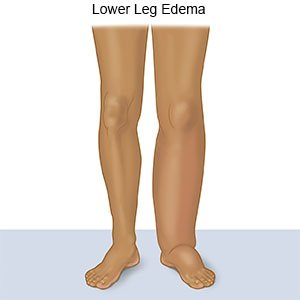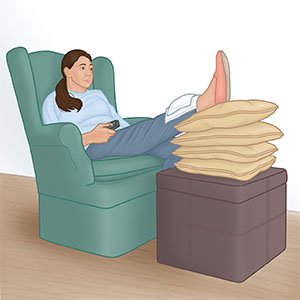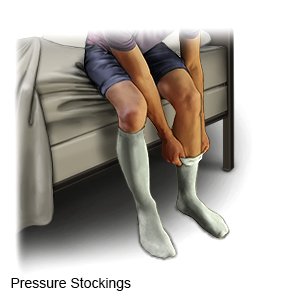Leg Edema
Medically reviewed by Drugs.com. Last updated on Apr 6, 2025.
Leg edema is swelling caused by fluid buildup. Your legs may swell if you sit or stand for long periods of time, are pregnant, or are injured. Swelling may also occur if you have heart failure or circulation problems. This means that your heart does not pump blood through your body as it should.
 |
DISCHARGE INSTRUCTIONS:
Call your local emergency number (911 in the US) for any of the following:
- You cannot walk.
- You have chest pain or trouble breathing that is worse when you lie down.
- You suddenly feel lightheaded and have trouble breathing.
- You have new and sudden chest pain. You may have more pain when you take deep breaths or cough.
- You cough up blood.
Return to the emergency department if:
- You feel faint or confused.
- Your skin turns blue or gray.
- Your leg feels warm, tender, and painful. It may be swollen and red.
Call your doctor if:
- You have a fever or feel more tired than usual.
- The veins in your legs look larger than usual. They may look full or bulging.
- Your legs itch or feel heavy.
- You have red or white areas or sores on your legs. The skin may also appear dimpled or have indentations.
- You are gaining weight.
- You have trouble moving your ankles.
- The swelling does not go away, or other parts of your body swell.
- You have questions or concerns about your condition or care.
Self-care:
- Elevate your legs. Raise your legs above the level of your heart as often as you can. This will help decrease swelling and pain. Prop your legs on pillows or blankets to keep them elevated comfortably.

- Wear pressure stockings, if directed. These tight stockings put pressure on your legs to promote blood flow and prevent blood clots. Put them on before you get out of bed. Wear the stockings during the day. Do not wear them while you sleep.

- Stay active. Do not stand or sit for long periods of time. Ask your healthcare provider about the best exercise plan for you.

- Eat healthy foods. Healthy foods include fruits, vegetables, whole-grain breads, low-fat dairy products, beans, lean meats, and fish. Ask if you need to be on a special diet.

- Limit sodium (salt). Salt will make your body hold even more fluid. Your healthcare provider will tell you how many milligrams (mg) of salt you can have each day.

Follow up with your doctor as directed:
Write down your questions so you remember to ask them during your visits.
© Copyright Merative 2025 Information is for End User's use only and may not be sold, redistributed or otherwise used for commercial purposes.
The above information is an educational aid only. It is not intended as medical advice for individual conditions or treatments. Talk to your doctor, nurse or pharmacist before following any medical regimen to see if it is safe and effective for you.
Learn more about Leg Edema
Treatment options
Care guides
Further information
Always consult your healthcare provider to ensure the information displayed on this page applies to your personal circumstances.
